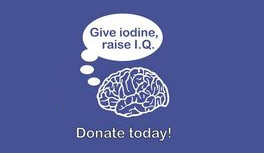Iodine Global Network (IGN)
Sprunglinks/Accesskeys
Zur Startseite (Accesskey 0) Direkt zur Hauptnavigation (Accesskey 1) Direkt zum Inhalt (Accesskey 2) Kontakt (Accesskey 3) Sitemap (Accesskey 4) Suche (Accesskey 5)
DONATE

5. What happens if we don't get enough iodine?
Iodine deficiency has multiple adverse effects on growth and development in animals and humans. These are collectively termed the Iodine Deficiency Disorders (IDD), and are one of the most important and common human diseases. They result from inadequate thyroid hormone production due to lack of sufficient iodine.
Thyroid hormones are essential for normal development of the brain. This is why the most damaging consequences of iodine deficiency are on fetal and infant development. If a fetus or newborn is not exposed to enough thyroid hormone, it may have permanent mental retardation, even if it survives. Low birth weights and decreased child survival also result from iodine deficiency.
Thyroid hormones are essential for normal development of the brain. This is why the most damaging consequences of iodine deficiency are on fetal and infant development. If a fetus or newborn is not exposed to enough thyroid hormone, it may have permanent mental retardation, even if it survives. Low birth weights and decreased child survival also result from iodine deficiency.

Adequate iodine is critical for a healthy fetus. Deficiency in utero can cause irreversible brain damage.
Cretinism and mental impairment
The most serious adverse effect of iodine deficiency in utero is damage to the fetus. Cretinism is a very severe degree of this brain damage; it includes permanent dense mental retardation, and varying degrees of additional developmental defects such as deafmutism, short stature, spasticity, and other neuromuscular abnormalities.
Maternal thyroxine crosses the placenta before onset of fetal thyroid function at 10–12 weeks and represents up to 20–40% of T4 measured in cord blood at birth. Thyroid hormone is required for normal neuronal migration and myelination of the brain during fetal and early postnatal life and hypothyroxinemia during these critical periods causes irreversible brain damage, with mental retardation and neurological abnormalities. The consequences depend upon the timing and severity of the hypothyroxinemia.
Maternal thyroxine crosses the placenta before onset of fetal thyroid function at 10–12 weeks and represents up to 20–40% of T4 measured in cord blood at birth. Thyroid hormone is required for normal neuronal migration and myelination of the brain during fetal and early postnatal life and hypothyroxinemia during these critical periods causes irreversible brain damage, with mental retardation and neurological abnormalities. The consequences depend upon the timing and severity of the hypothyroxinemia.

Two women with severe iodine deficiency. The older one on the left has a large goiter and the younger one on the right is a cretin, and is severely mentally retarded.
There are two types of cretinism: neurological and myxedematous cretinism.
The three characteristic features of neurological cretinism in its fully developed form are severe mental retardation with squint, deaf-mutism, and motor spasticity. The mental deficiency is characterized by a marked impairment of abstract thought.
Myxedematous cretinism is characterized by a less severe degree of mental retardation than neurological cretinism but has all the features of severe hypothyroidism present since early life, including severe growth retardation, and delayed sexual maturation. Subtle impairment of cognitive function is likely to occur even among offspring of pregnant women with mild or asymptomatic hypothyroidism.
Although new cases of cretinism are now rare, iodine deficiency still affects around 25% of the global population and can impair cognitive development. A meta-analysis of 18 studies concluded that moderate-to-severe iodine deficiency reduces mean IQ scores by 13.5 points. Iodine deficiency is thus considered the most common cause of preventable mental retardation worldwide.
During childhood, iodine deficiency has been linked to reduced intellectual and motor performance. Even in areas of mild-to-moderate iodine deficiency, cognitive impairment in school-age children is at least partially reversible by administration of iodine.
Iodine in this age group is further linked with somatic growth. Iodine status may influence growth through its effects on the thyroid axis. Administration of T4 to hypothyroid children increases their growth. Thyroid hormone promotes GH secretion and modulates the effects of GH at its receptor. Iodine repletion in iodine deficient children was found to be associated with increase in IGF-I and IGFBP-3 concentrations and improved somatic growth.
The three characteristic features of neurological cretinism in its fully developed form are severe mental retardation with squint, deaf-mutism, and motor spasticity. The mental deficiency is characterized by a marked impairment of abstract thought.
Myxedematous cretinism is characterized by a less severe degree of mental retardation than neurological cretinism but has all the features of severe hypothyroidism present since early life, including severe growth retardation, and delayed sexual maturation. Subtle impairment of cognitive function is likely to occur even among offspring of pregnant women with mild or asymptomatic hypothyroidism.
Although new cases of cretinism are now rare, iodine deficiency still affects around 25% of the global population and can impair cognitive development. A meta-analysis of 18 studies concluded that moderate-to-severe iodine deficiency reduces mean IQ scores by 13.5 points. Iodine deficiency is thus considered the most common cause of preventable mental retardation worldwide.
During childhood, iodine deficiency has been linked to reduced intellectual and motor performance. Even in areas of mild-to-moderate iodine deficiency, cognitive impairment in school-age children is at least partially reversible by administration of iodine.
Iodine in this age group is further linked with somatic growth. Iodine status may influence growth through its effects on the thyroid axis. Administration of T4 to hypothyroid children increases their growth. Thyroid hormone promotes GH secretion and modulates the effects of GH at its receptor. Iodine repletion in iodine deficient children was found to be associated with increase in IGF-I and IGFBP-3 concentrations and improved somatic growth.

Cretinism is also characterized by growth retardation and dwarfism. In this photo in central Africa, three young adult cretins with very short stature stand in front of a healthy man.
Goiter
Goiter, or thyroid enlargement, is often the most visible sign of iodine deficiency. The process begins as a physiologic adaptation in which the thyroid is more active in its attempts to make enough thyroid hormone for the body's needs, despite the limited supply of raw material (iodine). As iodine intake falls, secretion of TSH increases in an effort to maximize uptake of available iodine, and TSH stimulates thyroid hypertrophy and hyperplasia.
If this adaptation is successful and the iodine deficiency is not too severe, the person may escape with only an enlarged thyroid and no other apparent damage from the iodine deficiency.
If this adaptation is successful and the iodine deficiency is not too severe, the person may escape with only an enlarged thyroid and no other apparent damage from the iodine deficiency.

An enlargement of the thyroid or 'goiter' can be a sign of iodine deficiency.
Goiters in children are usually small, soft and diffuse, but over time, thyroid follicles may fuse and become encapsulated, a condition termed nodular goiter. The nodules can sometimes begin making too much thyroid hormone when suddenly exposed to iodine, leading to hyperthyroidism. This result occurs because the nodules are independent of usual controls; they make thyroid hormone at their own rate, and may over-produce it when given more iodine. Also, the nodular goiters in iodine deficiency have an increased rate of one type of thyroid cancer, called follicular cancer.
Large goiters may be cosmetically unattractive, can obstruct the trachea and esophagus, and may damage the recurrent laryngeal nerves and cause hoarseness. Surgery to reduce goiter has significant risks, including bleeding and nerve damage, and hypothyroidism may develop after removal of thyroid tissue.
Large goiters may be cosmetically unattractive, can obstruct the trachea and esophagus, and may damage the recurrent laryngeal nerves and cause hoarseness. Surgery to reduce goiter has significant risks, including bleeding and nerve damage, and hypothyroidism may develop after removal of thyroid tissue.

Large goiter is disfiguring and can impair breathing and speaking.
Impact on the community
In addition to these effects on the individual, iodine deficiency has adverse consequences for the community. The mental retardation can cover a wide range, from mild blunting of intellect to cretinism, and a large part of the population may have some intellectual impairment. The mean IQ of the deficient community is decreased by about 13.5 IQ points, according to one review.
Overall, iodine deficiency produces subtle but widespread adverse effects in a population, including decreased educability, apathy, and reduced work productivity, resulting in impaired social and economic development. Dramatic improvement typically occurs after appropriate addition of iodine.
Overall, iodine deficiency produces subtle but widespread adverse effects in a population, including decreased educability, apathy, and reduced work productivity, resulting in impaired social and economic development. Dramatic improvement typically occurs after appropriate addition of iodine.
